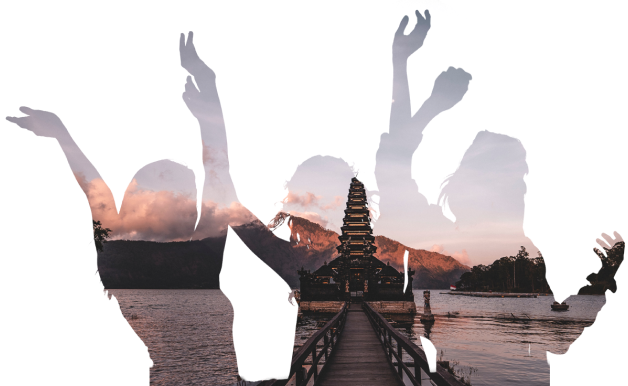
How Culture & Tradition Support Sustainable Development - Indonesia Green Traditions
Indonesia is known to be a country with rich traditions and culture. From Sabang to Merauke, each province has its own local beliefs and stances, making Indonesia very special and appealing as a tourist destination. Since sustainable development has become the primary concern and ecotourism has become much more popular in recent years, JOOi would love to take you on a journey to learn about Indonesia's traditions that support ecotourism and sustainability.
Nyepi: Balinese Day of Silence
Nyepi is descended from the word "sepi," which means silence. Nyepi celebrations are held to purify both individuals and the universe. As a result, on the day of Nyepi in Bali, individuals stay at home and engage in acts of fasting, prayer, and self-reflection. Every person in Bali is required to abide by a specific set of regulations. It is celebrated in solitude and often celebrated in March every year, in contrast to other New Year's festivities, which are typically celebratory and majestic. The Balinese will conduct the most significant purifying ceremony, called Melasti Ceremony, in the days leading up to Nyepi. There are some green benefits for the planet during Nyepi day.
Reduce carbon emission: 20.000 tons of carbon dioxide are reduced annually during Nyepi. It results from Nyepi law known as Amati Lelungan, which restricts outsiders. Pecalang, the local security force, will patrol throughout the day to ensure that no one goes out during the day.
Saves up to 60% electricity: Another Nyepi Day prohibition is Amati Geni, which translates to "no light and flames." No one is permitted to light their stoves or lamps. Bali saves 290 megawatts of energy, equivalent to 4 billion Rupiah.
Save fuel: Since no one is allowed to go out during this day, it reduces the use of energy in Bali up to 500.000 litres of diesel, equivalent to IDR 3 billion.
Inspire world silence day by the United Nations: On March 21, the United Nations formally established World Silent Day, which Triple-C first proposed, Collaboration for Climate Changes. The goal of World Silent Day is to reduce all human activities that harm the environment, such as global warming and climate change. Nyepi Day served as inspiration for World Silent Day.
Lilifuk: East Nusa Tenggara
The Baineo people of East Nusa Tenggara have a distinctive Lilifuk tradition for protecting the sea. A large saltwater pool called Lilifuk was created by covering various coastal areas for six months to a year. During this time, there shouldn't be any fishing or other activities that can harm the coral reef ecology inside the Lilifuk. A fine of cash, rice, or animals must be paid if the perpetrator disobeys this rule. Therefore, it is not unexpected that this restriction has conserved and significantly increased the potential of marine resources. Lilifuk is open twice a year, between June and December. Locals in the area will perform special ritual around that time before allowing anyone to catch the fish over there. They must, however, use caution when harvesting and share it equally with others in the area.
Bapongka: Sulawesi
The Bajo Tribe of Sulawesi appears to be inextricably linked to the ocean. Since ancient times, they have been called "People of the Sea." They construct homes on the water, spend a lot of time on boats, and have the ability to scuba dive to the bottom of the sea. Bapongka, which involves sailing to other places for a few weeks to many months, is one of their customs. This expedition is completed in groups using a traditional boat called a lepa and conventional fishing equipment. Because they have continued to employ traditional tools that do not harm or pollute the sea, this tradition is seen to be able to preserve the ocean. Additionally, they are legally obliged not to toss anything into the sea, even cooking charcoal and rice washing water. They think a natural disaster may happen if there is a violation.
Sasi: Maluku & Papua
In their respective areas, people from Maluku and Papua generally follow the Sasi tradition. Like the Lilifuk, Sasi has a specific period system that determines when people are permitted to harvest and utilise marine resources. The length of time it takes for the sea to 'open & close' varies according to the circumstances of each location. Some are shut down for three months, six, two, or even four years. If someone violates the rules during the ban, they will be penalised. In this manner, the area's marine ecosystem may be adequately protected and kept out of human hands for a while to keep it alive and unharmed.
JOOi believes that together we can preserve our planet while being responsible tourists. Isn't it amazing how local Indonesian tradition is aware of taking care of nature way more than the modern citizens? We would love to encourage our JOOibuds to be more aware and support ecotourism for our goods. JOOi is ready to be your travel buddy in this sustainable travelling journey. Explore Indonesia and its beautiful tradition while being conscious of the planet by checking our Deep Excavation tours for your next holiday
See you later JOOibuds.



